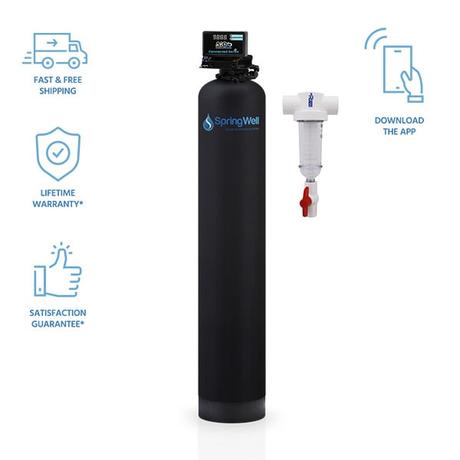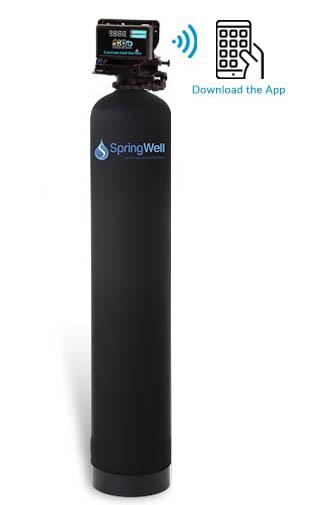What Does Sulfur Water Smell Like & How To Get Rid of It?
Updated: April 10th, 2024
Imagine coming home from a dreadful day at work. You draw a bathtub of hot water to unwind and forget about the day’s stresses. As the tub fills up, you smell a terrible rotten egg odor coming from the hot water. Moments later, you notice reddish-brown, orange, and black rust particles floating around in the bath. What the heck is going on? What do you do? Your washer smells like sulfur and is it even safe to shower in?
Don’t panic. Rotten egg smell in water and rust stains are common problems for many homeowners. But thankfully, they are pretty easy to fix. In this article, we will explain the main causes of these issues and what you can do to get rid of them and prevent them from ever reoccurring in your home.
Why does my water smell like rotten eggs?
Water can sometimes accumulate a chemical gas called hydrogen sulfide, which creates a horrible rotten egg odor as it is released. This gas occurs primarily in well water and groundwater and is produced by certain “sulfur bacteria”, chemical reactions inside the water heaters, pollution, or as a result of decay and chemical reactions with soil and rocks.
1. Sulfur reducing bacteria
A major source of the rotten egg sulfur smell in cold water is Sulfate Reducing Bacteria (SRB’s). These bacteria are not known to cause any diseases, but they “inhale” sulfate ions and “exhale” hydrogen sulfide, just like we inhale oxygen and exhale carbon dioxide. Similar to how an unventilated room can get stuffy when its jam-packed with people, any section of plumbing where there is no water flow can get smelly after a while when SRB’s are present. Because of this, the SBR’s will produce a strong odor in the cold water at first, then the odor may subside as the water flows.
2. A corroded magnesium or aluminum “anode rod” in the water heater
When the scent occurs in hot water, your water heater is most likely the culprit. Most water heaters come with a magnesium or aluminum “anode rod”, which is supposed to protect your water heater tank from rust. In most cases, the sulfate ions in the water react with the magnesium and aluminum to produce hydrogen sulfide gas. Since the gas is slightly soluble in water, once you turn on the hot water tap, the heat allows some of the gas to escape into the air, giving off a strong nasty smell. The problem gets even worse if your water heaters aren’t being used regularly. Irregular use of your water heater may cause the hydrogen sulfide gas to build up at a faster rate.
The Effects of Sulfur Smell in Water
When the soluble sulfides in hydrogen sulfide are hydrolyzed in water, it can corrode metals such as iron, copper, steel, and brass. When iron and steel are corroded from sulfur, they form ferrous sulfide or “black water.” This can blacken silverware and discolor copper and brass utensils.
Sulfur also makes it difficult to clean your laundry. It also corrodes exposed parts in washing machines. Iron and manganese, often present with hydrogen sulfide, can turn water black and greasy. If left untreated, the water can stain laundry, washing machines, sinks, and kitchenware. When the untreated water is used to do laundry, the chlorine bleach (if used) reacts with the iron and manganese and form dark rusty or brownish stains on clothes.
Furthermore, the bacteria that produce hydrogen sulfide gas also produce slime, which can create favorable conditions for other bacteria, such as iron bacteria. Iron bacteria can produce reddish-brownish slime, which can coat plumbing pipes and can lead to clogs and corrosion.
How to Get Rid of the Rotten Egg Smell or Sulfur Smell in Your Water
 Whole House Well Water System for Iron
Whole House Well Water System for Iron
There are several methods you can use to remove sulfur from water. The effectiveness of each treatment method depends on various factors, including the level of sulfur in the water, the amount of iron and manganese in the water, and whether or not bacterial contamination must also be treated. Before going forward with any of these treatment methods, you need to consider the simplicity of the approach as well as the total cost including installation, maintenance, and chemical expenses.
1. Remove iron with a well water filter system
The most effective way to treat and prevent sulfur from affecting you and your water is a well water filter. An iron filter can eliminate hydrogen sulfide in water as well as iron and manganese. This filter works by oxidizing the hydrogen sulfide then converting it into insoluble sulfur, which is then removed by the filtering process.
2. Add hydrogen peroxide
Performing a 3% hydrogen peroxide flush can help get rid of anaerobic bacteria. To achieve this, shut off your water’s heater’s cold-water inlet valve, drain some of the water from the water heater, then disconnect the metal hose that connects to the cold-water section of the heater.
Using the classic 3% hydrogen peroxide solution (available in most drug stores), pour one cup (8 oz) of hydrogen peroxide for every 10 gallons of your water heater’s capacity. For instance, a 40-gallon tank will need 4 cups of hydrogen peroxide or an entire 32-oz bottle.
Next, reconnect the hose, then turn the cold-water valve back on to refill the tank and let it sit for a few hours. The peroxide will destroy the bacteria and remove the smell that they give off. You could also use chlorine bleach, but the peroxide is much safer and more environmentally-friendly.
3. Use a proper whole house water filter
The presence of sulfur odor at only certain sinks in your home could mean that the source is somewhere in the drains, fixtures or pipes – and not the water. In this case, a simple disinfection or flushing procedure may be enough to remove the odors. However, if you can detect the odor at every faucet, then the source is most likely the water itself. Here, a whole house well water filtration system with a UV filter would be recommended. But regardless of the source, installing a whole house well water filter that removes hydrogen sulfide and bacteria is ideal. These systems can reduce bad odors and protect you and your family from other chemicals and microbial contaminants.
Springwell Water also has a great line of activated carbon whole house water filters that removes as low as 1 ppm of hydrogen sulfide from the water, this would be ideal for homes on city water that might also have chlorine in their water. These systems absorb and trap the gas in the pores of the carbon, thus removing it from the water. The UV filter treats both bacteria and hydrogen sulfide gas.
Why do I Need a Well Water Filter Treatment in the First Place?
Drinking water can expose people to a host of toxic pollutants and pathogens. Because of this, public water systems employ various water treatment methods and monitoring tactics to protect consumers from such contaminants. Private wells, on the other hand, generally do not receive the same treatment and services that public wells do. Therefore, private well owners are responsible for protecting their water from potential contaminants like:
- microorganisms (like bacteria, viruses, parasites, etc.);
- nitrate and nitrite;
- heavy metals (such as lead, copper, arsenic, etc.);
- radionuclides (uranium and radium);
- organic chemicals (found in inks, paints, solvents, disinfectant, pharmaceuticals, etc.);
- fluoride;
- and others.
Without a premium whole house well water filtration system, these contaminants can easily make their way into your household and wreak havoc on you and your family’s health and personal grooming, your water-using appliances, water heaters, and so forth.
Thankfully, the best whole house well water filters can remove almost every contaminant that is present in groundwater, keeping it pure and safe to drink. These systems also improve the taste and smell of your drinking water by removing minerals like sulfur that can make your water smell like rotten eggs. Furthermore, some whole house well water filtration systems can prevent buildup and corrosion in pipes and appliances, helping both last longer, and saving you from potentially costly repairs. They can also improve water quality and discoloration, and most importantly, give you peace of mind.
Why are Rust Colored and/or Black Stains in my Washer and Fixtures Like my Sink?
The rust stains in your sinks, tubs, toilet bowls and on your laundry are a result of what’s in your water. If you have a buildup of iron or other minerals in your water supply, you may notice that no matter how often you clean your sinks or toilets, they still accumulate reddish-brown, orange, or black stains around your drain or inside your toilet bowl. These stains are caused by large amounts of iron in your water. This is because minerals like calcium, iron, and magnesium attach to nearly every surface they encounter.
In deep wells where oxygen is relatively low, water containing dissolved iron and magnesium will still appear clear and colorless at the tap. But once it is exposed to air, the iron becomes oxidized and leaves a solid reddish-brown stain on laundry, plumbing fixtures, porcelain toilet bowls, and can even affect your hair and skin. When rust forms in your washing machine, it can stain your clothes as well, leaving some white fabrics appearing slightly yellow or orange after being washed.
Okay, so What is the Best Iron Water Filtration System for Well Water?
Like any product, there are lots of different brands and models of whole house well water filtration systems on the market. However, the Springwell Whole House Well Water Filter System reigns superior in all aspects of a top whole house well water filtration system. We’re talking about an impeccable design, robust functionality, unique, innovative technologies, the whole works. It’s no wonder why it’s the best whole house well water filter system available for purchase these days.
 Well Water Filter
Well Water Filter
The Springwell Whole House Well Water Filter System efficiently removes iron, sulfur, and manganese, all of which are often found in well water. This system uses the latest technologies in water filtration to remove some of the most toxic contaminants from well water. Plus, it’s more economical and environmentally-friendly than most other well water filtering systems on the market.
Impressive Features and Technologies
When paired with a salt-based or salt-free softener and a powerful UV light, you can ensure a more thorough filtration process. The softener combos help remove hardness minerals from your water that would otherwise irritate your skin and hair and destroy your laundry, water-using appliances, pipes, and plumbing fixtures. You can choose between the salt-based model and the salt-free model, depending on your situation.
Combining the Whole House Well System with the Whole House Water Filter and Salt-Free Water Softener Combo System gives you one of the most robust private well water filtration systems on the market: the all-mighty ULTRA Well Water Filtration Combo System. This combo system removes iron, manganese, hydrogen sulfide, chlorine and chloramine, haloacetic acids, herbicides, pesticides, sulfur, MTBE, and TTHM, limescale buildup, calcium buildup, and hard water minerals.
Whether standalone or combo, these systems require no maintenance and can be set to have a daily backwash to remove the accumulated contaminants, as well as replenish the filter media bed. The regeneration process also adds an air pocket to the system.
Powerful 4-Stage Well Filtration Process
During the filtration process, the system filters out silt clay and sand through the 5-micron sediment filter. Afterward, stage two forces the water through a KDF media, which removes harmful chemicals such as chlorine, as well as some heavy metals. Step three, which is designed using a coconut shell carbon media, removes organic contaminants, including chlorine, chloramine, VOCs, pesticides, herbicides, and so forth. Lastly, stage four eliminates channeling and establish more contact time with the water.
The filtered water then goes through the salt-free water softener, where the hardness minerals are removed through a physical process known as Template Assisted Crystallization (TAC). This process converts the hardness-causing minerals in the water to a hardness crystal that will not stick to any surface in your home.
The feature-rich UV water purification system add-on then controls microbiological issues in water, including E. coli, Cryptosporidium, and Giardia lamblia. This system kills 99.9% of harmful pathogens, viruses, and bacteria to protect your home against contaminated water.
 Well Water Filtration Diagram
Well Water Filtration Diagram
Verdict
Owning a private well can be a great way to supply your home with fresh, clean water. But ensuring that the water is always safe can be challenging. Thanks to the Springwell Whole House Well Water Filtration System, you make that dream a reality by blocking out contaminants in your well water before they enter your house.
Visit our website at www.springwellwater.com to discover more premium products, and make sure to check out the best water filtration system for your home to view more options for safeguarding your home against harmful water contaminants.
